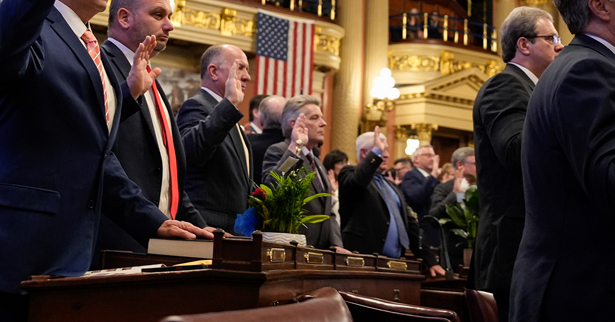

Does Size Matter?
January 31, 2018
This coming week, HB153 – a constitutional amendment to reduce the size of the Pennsylvania House of Representatives from 203 to 151 members – will come to the floor of the House for debate and a vote to submit the question to the voters for ratification.
While there is no question the people of this Commonwealth have an absolute right to make such a change to our fundamental law, some thought should be given to the ramifications and unintended consequences of doing so.
Any claim that this measure will save taxpayer dollars is purely speculative. Certainly, the salaries and benefits of 52 fewer members will be registered, but there is no guarantee the remaining 151 members will not seek to establish additional district offices, hire more staff, and increase budgets to serve the roughly 20,000 additional constituents each would gain. With over 2300 employees, the General Assembly staff is the real driver of personnel costs.
There will surely be arguments that a House with fewer members would be "easier to manage" and "more efficient." Are these really desirable objectives? Perhaps they are for legislative leaders, but likely not for those who appreciate the republican form of government where ideas need to win the approval of many voices to pass muster. Consider a few things which have gotten done quickly over the years in Harrisburg: massive pension grabs, last minute gut-and-replace gambling bills, and midnight pay raises. The "efficiency" of how these measures became law should not be our goal.
For those who believe special interests and lobbyists hold too much sway in Harrisburg, reducing membership numbers in the House would grant them a 25 percent discount for continuing down that path. In fact, the original reason the House was expanded to 203 members was to make it more difficult for special interests to influence legislators.
Fewer House seats would also strengthen all aspects of incumbent protection. Regular citizens who wish to challenge incumbents at election time would have 25 percent more voters to reach and 25 percent higher advertising costs while experiencing a 25 percent lower chance of gaining the favor of local party officials who are instrumental in recruiting and grooming candidates for office.
After the 2005 pay raise I was one the most vocal critics of the General Assembly. I now am a member of the House of Representatives. I didn't believe then that reducing the number of House members was a good idea all by itself, and I don't believe it now.
Changing the number of legislators in Harrisburg may indeed be part of some future plan to improve government in Pennsylvania, but only if a host of other related issues are simultaneously addressed. This could be accomplished at a constitutional convention. In fact, all previous changes to the size of the legislature in Pennsylvania have been provided through the convention process, where a more holistic view is possible.
Does size matter? Certainly, there is nothing magic about the number 203. But there is nothing magic about the number 151, either. Focusing our attention on size alone does not promise better government. It does not ensure greater individual liberty or equality. It does not secure more successful policy or fairer law.
HB153 currently exists in a vacuum. No other related issues are being contemplated or included in the plan. As such, it cannot be considered real reform. Instead, it is a myopic feel-good change which would further empower Harrisburg insiders while increasing their isolation from the citizens of this Commonwealth.






